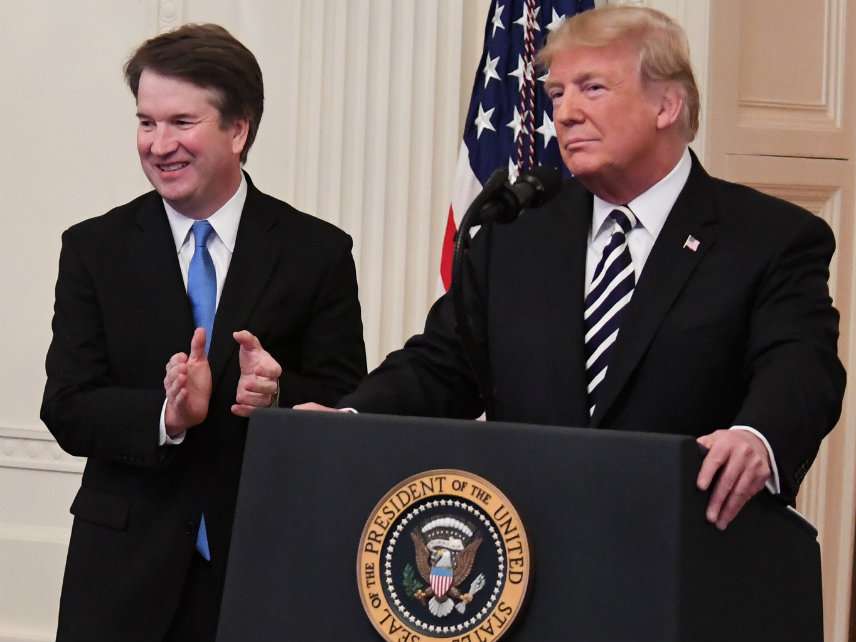Kavanaugh's Elevation to the Supreme Court Is a Moment of Worrying Instability
His true impact may be less about transforming the Court's ideology, and more about altering its status in political life.

Brett Kavanaugh's confirmation to the Supreme Court leaves us with more questions than answers. For starters, what effect will it have on the upcoming midterm elections—or, for that matter, on 2020? How will this alter political discourse and party tactics, especially where the court is concerned? And, perhaps overlooked during the last few weeks, how will Kavanaugh, and the Roberts Court he is now part of, rule?
My suspicion, and my worry, is that he will have a smaller direct impact than many seem to think, but that the partisan entrenchment surrounding his nomination will shake the Court to its core.
The answer to the first question seems to be that the Kavanaugh fight will boost Republicans in the Senate and Democrats in the House, probably dividing control of Congress in the process. Senate Majority Leader Mitch McConnell has said that Kavanaugh's confirmation will fuel Republican enthusiasm in November. "This has energized our base like nothing we've been able" to do, he told Bloomberg. Midterms have lower turnout than elections in presidential years; Republicans are counting on Kavanaugh to help them maintain, and perhaps expand, control of the upper chamber. Democrats, meanwhile, see Kavanaugh's confirmation as helping them in key House races, many of which are in suburban swing districts—adding to the likelihood that they regain a majority.
Kavanugh's confirmation, in other words, is likely to sharpen the partisan divide. Which brings us to the second question: How will the major parties alter their tactics and strategies going forward? Republicans are nearly certain to advertise their personal and party-wide fortitude in pushing the nomination through; McConnell, characterizing his attitude towards the Kavanaugh confirmation battle, reportedly described himself as "stronger than mule piss." (I'll take his word that mule piss is strong.) Democrats, in turn, have begun to talk more openly about procedural radicalism, from court packing, which Stormy Daniels lawyer Michael Avenatti (who also represented Kavanaugh accuser Julie Swetnick) has said should be a litmus test for Democrats in 2020, to impeaching Kavanaugh from the Supreme Court. Asked recently, neither Sens. Kamala Harris nor Cory Booker—both likely 2020 contenders—would explicitly rule out the latter possibility. Democrats may not pursue either of these options. Still, expect Washington's procedure wars to intensify.
And what of Kavanaugh as a jurist? In some ways this question has been overshadowed by the sexual assault allegations, but now that Kavanaugh has a seat on the Court, it returns to the fore.
Although Kavanaugh is replacing Anthony Kennedy, who for years has acted as the High Court's swing vote, it is Chief Justice John Roberts who is now likely to be the most frequent deciding vote in close cases. Roberts is more conservative than Kennedy in some ways, but he is an incrementalist deeply concerned with the court's legitimacy. In part because of these tendencies, I think it is unlikely—though certainly not impossible—that the Roberts Court as it currently exists will fully overturn Roe v. Wade, the case that secured a national right to abortion and that has driven much of the fight over Kavanaugh. If a sixth conservative justice were to be added, that calculus might change.
Another attack on Kavanaugh held that he might outlaw Obamacare's preexisting conditions rules, which a group of conservative state attorneys general are currently challenging. The White House has, somewhat unusually, declined to defend those rules. Here, too, I suspect that Kavanaugh will not be decisive. The case itself is legally weak; and as a lower court judge, Kavanaugh wrote an opinion that provides a playbook for upholding those rules.
Kavanaugh's judicial elevation, then, may feel more important than it actually is. Yet the perception of his pivotal status is likely to continue to drive debates about the Court, just as it drove debates about Kavanaugh's nomination. His true impact may be less about transforming the Court's ideology and more about altering its status in public life.
With Kavanaugh on the bench, it is possible, even probable, that the Supreme Court, like almost everything else in politics today, will become further subsumed by the culture war, transformed into a reality TV spectacle under a reality TV president. This transformation has been underway for decades, but Kavanaugh seems certain to accelerate it.
For those who view the Court's proper role as a vehicle for preserving the constitutional order—for checking both the authoritarian tendencies of the executive and the populist excesses of Congress—this is a moment of worrying instability. In time, the turbulence may pass, as it has before. But looming over all the questions surrounding Kavanaugh's confirmation is whether the Court, and the constitutional system it is intended to guard and protect, can maintain the authority and legitimacy it needs in order to perform its role. Kavanaugh may have survived this confirmation process, but in the process he may have the left the reputation of the Supreme Court itself more bruised and vulnerable than ever before.


Show Comments (339)